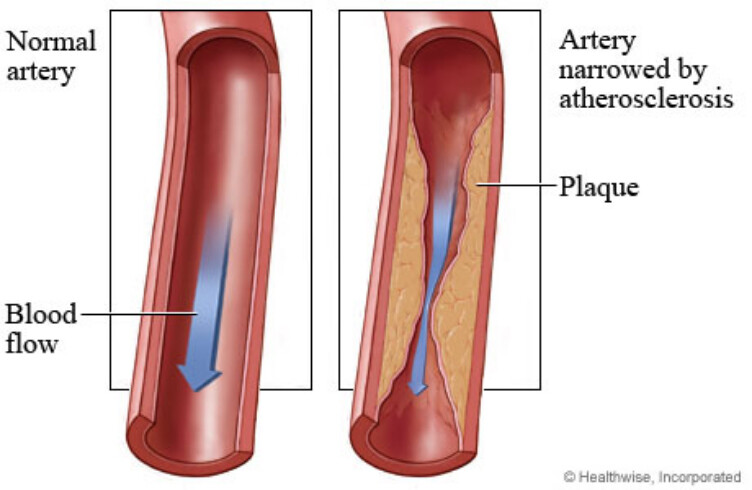By Sande E Oundo
Cholesterol is a waxy substance found in one’s blood. The body needs cholesterol to build healthy cells, but high levels of cholesterol can increase the risk of heart disease. Cholesterol comes from two sources. The liver makes all the cholesterol and the remainder of the cholesterol in the body comes from foods from animals. For example, meat, poultry and dairy products all contain dietary cholesterol.
Once in the body, Cholesterol can join with other substances to form a thick, hard deposit on the inside of the arteries. This can lead to narrowing and hardening of the blood vessels thus making them less flexible – a condition known as atherosclerosis.
At the onset, there are usually no symptoms, in some cases, symptoms generally begin around middle age, often presenting as a silent death. Almost all people are affected to some degree by the age of 65. It is the number one cause of death and disability with more than 50% of deaths worldwide as it can result in a heart attack, stroke, kidney failure, and leg amputation depending on which blood vessels are affected.
Causes
Just like diabetes, obesity is the main risk factor for getting atherosclerosis. Excess weight can lead to fatty material (Cholesterol) building up in your arteries (the blood vessels that carry blood to your organs). If the arteries that carry blood to your heart get damaged and clogged, it can lead to a heart attack. If this happens in the arteries that carry blood to your brain it can lead to a stroke or vascular dementia.
With high cholesterol, fatty deposits develop in your blood vessels. Eventually, these deposits grow, making it difficult for enough blood to flow through your arteries. Sometimes, those deposits can break suddenly and form a clot that causes a heart attack or stroke. High cholesterol can be inherited, but it’s often the result of unhealthy lifestyle choices, which make it preventable and treatable.
There are different types of cholesterol in the blood that play multiple crucial roles in the body. There is a lipoprotein, a combination of lipids and proteins that carry other cholesterol, other types of fats, and fat-soluble products like vitamins in the bloodstream. Low-density lipoprotein (LDL), very low-density lipoprotein (VLDL), and intermediate-density lipoprotein (IDL) are the ones that deposit in the blood vessels when an injury happens to the inner layer which is why they are called bad cholesterol.
High-density lipoprotein (HDL) is responsible for removing the other lipoproteins like LDL and other fat cells from the bloodstream to the liver to be metabolized and excreted, hence why it is called good cholesterol.
Hypertension, diabetes, autoimmune diseases like rheumatoid arthritis, chronic stress, excessive intake of alcohol, and tobacco smoking also can lead to atherosclerosis because of recurrent damage to the inner lining of the arteries and exposing cholesterol to enter the blood vessel’s inner layer starting the process of atherosclerosis.
Familial hypercholesterolemia is a genetic disorder whereby families have high levels of LDL cholesterols.
Therapy
Some medications can reduce the production of cholesterol in the body called statins, normally prescribed to people with a history of metabolic illness of age beyond 50. However, those medications have a multitude of side effects like disabling muscle pains, brain decline, and even an increased risk of diabetes and cancers.
There are simple things you can do to avoid and eliminate a high accumulation of fats that predispose to atherosclerosis like;
- Restrict consumption of foods that are full of saturated fat like processed food, fried food, and overconsumption of meat and milk since they all increase LDL (bad cholesterol) the main source of cholesterol buildup and blockage in the arteries.
- Consume foods rich in monounsaturated fatty acids, a healthy type of fat that boosts HDL and lowers LDL like avocado, nuts, seeds, and vegetable oils (peanut and olive) because they increase HDL-good cholesterol which is good in the removal of cholesterol from your arteries.
- Intermittent fasting promotes weight loss and appears to improve blood pressure, reduce bad cholesterol levels and reduce the occurrences of atherosclerosis.
- Moderate physical activity can help raise high-density lipoprotein (HDL) cholesterol, the “good” cholesterol.
- Getting regular sleep.
- Meditating to reduce stress.
- Taking vitamin B3-rich food like liver and fish.
- Avoid smoking and excessive alcohol intake.
- Early screening for high blood pressure (hypertension), high blood glucose (diabetes) and hyperlipidemia (high lipids in the blood).
In conclusion, Cholesterol is a waxy, fat-like substance that’s found in all the cells of the body. Its main function is to maintain the integrity and fluidity of cell membranes and to serve as a precursor for the synthesis of substances that are vital for the organism including steroid hormones, bile acids, and vitamin D. Therefore, the human body needs some cholesterol, however, the body can make all the cholesterol it needs cholesterol production is so important that your liver and intestines make about 80% of the cholesterol you need to stay healthy click here and therefore excesses of cholesterol from fatty foods is detrimental to one’s health thanks to its well-known role in promoting heart disease and thus should be avoided.
Sande Elison Oundo is the President of Vigilant Living, an online wellness, counselling and coaching firm.
If you would like your article/opinion to be published on Uganda’s most authoritative news platform, send your submission on: [email protected]. You can also follow DailyExpress on WhatsApp and on Twitter (X) for realtime updates.



